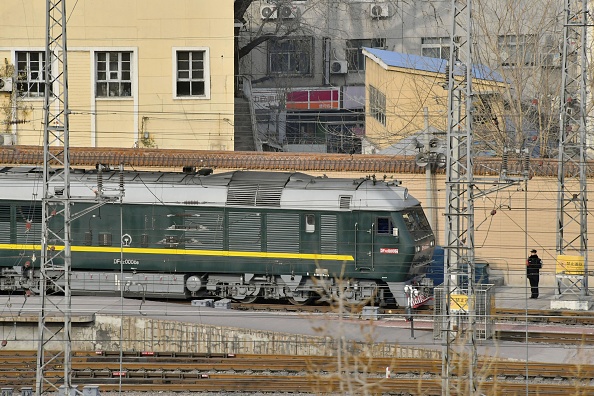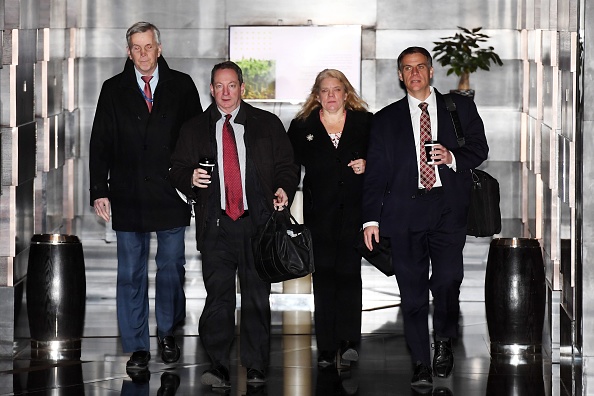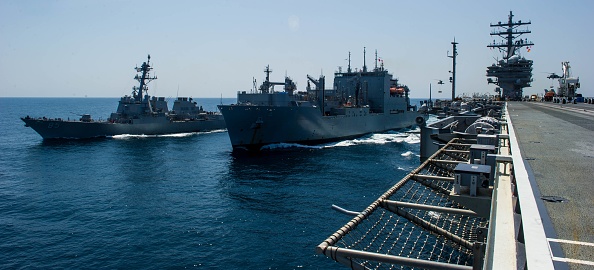
 Kim Jong-un Visits Beijing
Kim Jong-un Visits BeijingNorth Korean leader Kim Jong-un arrived in Beijing for a 2-day trip this Tuesday at the invitation of President Xi, according to state media of both countries. News broke of the trip only after Kim's signature armored train passed through the northern Chinese city of Dandong.
Kim's trip to China-- his fourth in the last 10 months-- allowed the two leaders to develop a strategy towards a second summit meeting between Kim and Trump after the first in Singapore last June. President Xi encouraged both countries to restart talks and to "meet in the middle", according to Xinhua.
The visit came as negotiations about North Korean denuclearization have fallen off since the first summit meeting, and US sanctions continue to impede growth of the North Korean economy. Kim recently expressed his impatience with Washington in his New Year's Day address last week, stating on state-run television: "I am willing to meet the United States president at any time for the betterment of our international community." Kim was also sure to note his intent to "come up with new initiatives and new measures" if the US was unwilling to make concessions. Against this backdrop, a second Trump-Kim summit meeting would potentially restart negotiations between the two adversaries.
As North Korea's only ally and aid provider, China plays a critical role in the tumultuous relationship between the US and North Korea. North Korea currently faces crushing economic sanctions from the US that will likely only be lifted if North Korea denuclearizes. While North Korea has stated it has paused its nuclear programs for over a year, and has destroyed parts of its only known nuclear test site, Washington stated it will only lift sanctions after total denuclearization of the closed-off state. Currently, US sanctions prohibit all companies, businesses, organizations and individuals that trade with North Korea from accessing the US economy. Despite the US's unmoving position, North Korea still represents one of Washington's biggest national security concerns. China's relationship with Kim and perceived ability to persuade North Korea to cooperate could provide more leverage for Xi amid US-China trade negotiations.
An advocate of economic cooperation on the Korean Peninsula, South Korean President Moon Jae-in supported Kim's New Year's Day address. "North Korea has already mentioned halting missile tests, suspending nuclear facilities," he said. "When the U.S. takes corresponding measures and builds trust, the denuclearization process will move along."
 Second Round of US-China Trade Talks
Second Round of US-China Trade TalksTrade talks between mid-level Chinese and American officials ended this Wednesday in Beijing after being extended from 2 days to 3 days. Both sides reported positive outcomes but were tight-lipped regarding exact details.
Discussions included intellectual property rights, forced technology transfer and China's pledge to buy "substantial" amounts of US agricultural, energy and manufacturing products, according to US reports. Vice Premier and China's top trade negotiator Liu He made an unexpected appearance Monday, leading analysts to believe that talks were going well. US and Chinese markets climbed throughout the negotiation, which spilled over to global markets, but eventually declined as post-negotiation optimism wore off.
Following the meeting, China's Ministry of Commerce said that the two sides would "maintain close contact," but no definitive plans for a next meeting have been released yet. Vice Premier Liu He is expected to fly to Washington on January 30-31 to meet with US Trade Representative Robert Lighthizer and US Treasury Secretary Steven Mnuchin. Mnuchin told reporters Thursday that he doesn't expect the US government shutdown to affect the Vice Premier's trip.
Originally, President Trump and Vice President Wang Qishan were expected to meet on the sidelines of the World Economic Forum in Davos later this month, but Trump, citing concerns for national security of not having a border wall, cancelled his trip this Thursday.
Negotiations will continue until March 2, after which the US will continue to raise tariffs.
International media is watching closely as the global economy continues a rollercoaster ride in recent weeks. "You're looking at enough of a tightening in financial conditions to say that a global recession is a real risk," says Peter Hooper, a former Federal Reserve official and Deutsche Bank's chief economist.
 South China Sea Warms Up
South China Sea Warms UpUSS McCampbell sailed past the Paracel Islands earlier this Monday in the US's first freedom of navigation operation of the year in the South China Sea, the latest reminder that the disputed waters remain a potential international security and military flashpoint.
According to Lt. j.g. Rachel McMarr, a U.S. Pacific Fleet spokesperson, "On Jan. 7 (local time), guided-missile destroyer USS McCampbell (DDG-85) conducted freedom of navigation operations in the South China Sea. McCampbell sailed within 12 nautical miles of the Paracel Islands to challenge excessive maritime claims and preserve access to the waterways as governed by international law."
Lu Kang, China's Foreign Ministry spokesperson, criticized the operation: "The Chinese side immediately sent military vessel and aircraft to conduct verification and identification on the U.S. ship and warned it to leave. We have lodged stern representations with the U.S. side."
In response to the FONOP, Chinese state media announced Wednesday that it had deployed missiles "capable of targeting medium and large ships" from 3,400 miles away (5,471 kilometers) in the country's Northwest plateau and desert areas.
Media coverage regarding the South China Sea has been quiet but has slowly picked up in recent weeks. In late December, UK Defense Secretary Gavin Williamson expressed interest in expanding its military bases in the South China Sea after Brexit plans consolidate, and on Saturday Taiwan leader Tsai Ing-wen encouraged British presence in the disputed region and "called for increased international support to defend the self-ruled island from renewed threats from Beijing."
Today, Russian foreign ministry spokeswoman Maria Zakharova stated that such measures were "counter-productive, destabilising and possibly of a provocative nature... In the event of any measures that pose a threat to Russia's security or that of its allies our country reserves the right to take appropriate retaliatory measures."
Following suit, "[Indonesian] President Joko Widodo has followed through on a two-year-old pledge to strengthen Indonesia's military presence on Natuna Besar, the largest of several hundred small islands on the southern fringe of the waterway," according to The Asia Times.
While international scrutiny has largely focused on the US-China trade war, this quick resurgence in tensions points to the deep, unresolved issues that remain surrounding the South China Sea.
Prepared by China-US Focus editorial teams in Hong Kong and New York, this weekly newsletter offers you snap shots of latest trends and developments emerging from China every week, while adding a dose of historical perspective.
- 2019-01-04 Cross-strait tensions mount on anniversary
- 2018-12-21 Xi’s 40th Anniversary Speech
- 2018-12-14 Post-G20 Detentions & Tech Tensions
- 2018-11-30 Trump and Xi Set to Face Off at the G20
- 2018-11-26 Xi Strengthens Alliances in Preparation of G20
- 2018-11-16 World Leaders Meet at ASEAN and APEC Summits to Discuss Economic Strategy
- 2018-11-09 US and China Hold Delayed Diplomatic and Security Dialogue
- 2018-11-02 Presidents Xi and Trump Talk Possible Trade Deal
- 2018-10-26 With U.S. Pressure, China and Japan Grow Closer
- 2018-10-19 Secretary Mattis Meets Chinese Counterpart in Singapore
- 2018-10-12 Trump and Xi May Meet at the G20
- 2018-10-05 U.S. Vice President Articulates Hard Line on China in Speech
- 2018-09-28 A Turbulent Week For China-U.S. Relations at the UNGA
- 2018-09-21 China Will Not Purposefully Devalue the Yuan, Premier Li Keqiang Says
- 2018-09-14 China and the U.S. Discussing New Trade Talks, As Pressure Over Trade Policy Grows
- 2018-09-07 Forum on China-Africa Cooperation Yields New Pledges
- 2018-08-31 BRI’s Fifth Anniversary Comes Amidst Debate Over Sustainability
- 2018-08-24 Trade Talks Continue in DC as New Tariffs Hit
- 2018-08-17 Trade Talks Back On